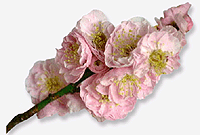Japanese Apricot
Prunus mume has several confusing common names, including Japanese apricot and flowering plum. Actually it is a native of China and it is an apricot, not a plum. This delicate plant has entered into the culture of China in a way that no plant has entered into the culture of any other country. Because it produces its blossoms on bare branches in winter, it is known as a symbol of strength in adversity. It is often depicted in the single white, five petalled form in Chinese art, or seen as a decorative motif on porcelain. The fruit is a yellow, sour apricot which is pickled and served as a condiment with rice, and made into the ‘plum sauce’ commonly used in Chinese cooking.
Plant details
Common name: Japanese apricot
Botanical name: Prunus mume
Description: Small deciduous tree to about 9 metres (30′) tall. The foliage is light green and the tree usually has a rounded habit, but this varies depending on the cultivar. The flowers are about 25mm (1″) in diameter and are produced on bare branches in winter. They can be single or double, and they range in colour from white, light pink, dark pink and rose through to red. The fruit is a warm golden colour.
Best climate: Prunus mume will grow in all the cooler parts of Australia and on the coast at least as far north as Sydney.
Best look: specimen tree, especially planted in a small garden or walled area where the fragrance can linger planted near a walkway or path so that passers-by can appreciate the fragrance cut flowers for indoor decoration and perfume bonsai
Good points: extravagant floral display in the depths of winter spicy fragrance ornamental golden fruit
Care: These plants grow best in well drained, fertile soil in a full sun position.
Getting started: Japanese apricot (Prunus mume) is available bare rooted from nurseries, for around $30-$50.



